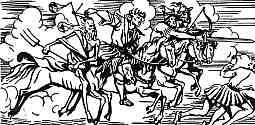|
A Radio Talk by Charles F. Kettering We have behind us over three years of world-wide conflict. The Four Horsemen of the Apocalypse War, Famine, Pestilence and Death - have ridden over the face of the earth leaving in their wake Misery and Despair.  Millions of lives and the production of other millions have been lost. All over the World peaceloving people labor earnestly to satisfy the demands of war. This accumulated toll of suffering and the loss of lives and property must be entered on the ledger as part of the price our generation has paid to save the World from tyranny and aggression. And the Four Horsemen still ride! But the picture is not as black as it was last year - or the year before when the books were audited. In fact we are able to recognize the first streaks of light that will herald the new day bringing with it Victory and Peace. Recently, I read an article in which the author said that Peace as well as conflict must have Four Horsemen. He named the horsemen of Peace as Hope, Good Sense, Experience and Science. |








